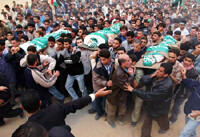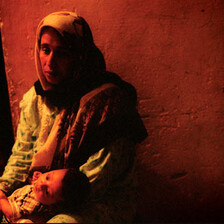
AP Photo/Marco Di Lauro
It was stupid and it was a total waste of their young lives, which is why Hamas issued a statement calling on children not to act as martyrs for Palestine until they were ready; until they were old enough. There were three funerals in Gaza Thursday morning, April 24th, and the fathers of each of the boys spoke about their sons to my friend Robert and me. The fathers didn’t even know the three boys were friends and each of the funerals took place separately in different parts of the city, the families unknown to each other; the grief equally palpable in each location.
Why do you think your son did this?
“Why? Why?” Ismail’s father threw the question back at us. “You tell me,” he said. “You tell me why an intelligent boy, the top of his class, not living in the poverty of Gaza would throw his life away like this. I ask you. You tell me.”
Ismail, Yusuf, and Anwar didn‚t have that much in common except that they were all excellent students and they all, in the last few months, had spent hours watching the news — Al-Jazeera, Al-Manar, Abu Dhabi, BBC, CNN — and asking their fathers more and more about the situation in Palestine. Ismail’s father described it the most eloquently when he said his son kept asking him why nobody was intervening to help the Palestinians — not the Americans, not the Europeans, not the Arab world. Why were they all alone? All three boys had been affected recently by what happened in Jenin. The Israelis will get away with this massive war crime, of course.
They will also get away with murdering three teen-aged boys possibly armed with knives in an open field at Netzarim. Two of the boys were unrecognizable to their fathers. The blast of one of the bullets shattered the skull of Yusuf; Anwar’s face had been shot off. Ismail was shot in the head and chest, but his father still knew it was his son. As they lay on the ground — dead or not yet dead, it is unclear — a tank rolled over their bodies crushing them, disemboweling them, severing their legs from their bodies. Dogs tore at them after that as they lay there in the night. At 4:00 on Wednesday afternoon the boys‚ bodies were finally handed over to the Shifa hospital in Gaza.
Will the Israelis come to Gaza?
—Like I am seeing you.
This is how human rights lawyer Raji Sourani answered this question. Not everyone agrees with him; I have to admit, however, that he has me convinced. The “when” is still an open question. Probably not while Crown Prince Abdullah is driving around with George W. Bush at the latter’s ranch in Texas. But that visit is not about Palestine; it’s about Saudi Arabia. Don’t be fooled into believing the Arab governments give a whit what happens to the Palestinians. Only Saddam Hussein is in a hopeless enough position to issue “fuck yous” to the Americans, which is no doubt why an Iraqi flag flew at one of the boy’s funerals.
On TV they‚re still arguing over whether what happened at the Jenin refugee camp was a massacre or not. Are there mass graves? Hundreds of bodies? Wasn’t Jenin, after all, a “terrorist nest”? Didn’t the Israelis have the right of “self-defense”? The questions get more obscene as the reality fades from the screen: 13,000 people have had their lives destroyed. Their homes are dust, their belongings wiped out, their sons or brothers or fathers in many cases dead, wounded, or detained in prison. How will the families survive now? There is no food, water, electricity, shelter. These are refugees twice over being asked to cope again; villains for being occupied by America’s best friend.
I hope there are no mass graves. I hope there is no more evidence of massacre and summary execution. Isn’t what happened in Jenin bad enough? Do thousands of people have to be slaughtered for the world to pay any attention? For people to understand that this was an immense war crime? Has the Occupation of Palestine become so routine, so normal, that the misery it creates is acceptable until it creates rivers of blood?
A friend writes that he’s sympathetic to my views but am I not just a little biased? What about the families of the victims of the terrorist suicide bombings in Israel? Do I not feel their pain? It takes a polished product of American propaganda culture to ask this question.
I tell him that you are only partly human if you can only feel one people’s pain. Not just here in the speck of land called Israel/Palestine but wherever your finger lands when the spinning globe stops. The problem is in acknowledging the causes, the responsibility, and the indiscrimination of suffering. Israelis do not bleed more when they are killed; their families do not weep more tears. It’s only the news you read that has made you believe this.
My landscape now is Jabalia, Rafah, Khan Yunis, Bureij — simmering in nervous anticipation of the coming deluge; my horizons are the sea, the sky, the desert, and the war. In Jenin last Friday I met a five year old girl with a feverish face who had gone mad. She no longer knew who she was or where she was. When I looked into her eyes I saw nothing. She belongs to the horizon of war.
The picture shows a crowd of Palestinians carry the bodies of Yossef Zakuot, 14, Anwar Hamdona, 14, and Ismail Abu Nada, 13, during their funeral procession in Gaza city, Gaza Strip, Wednesday, April 24, 2002.



